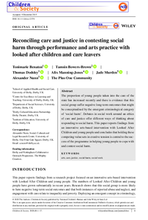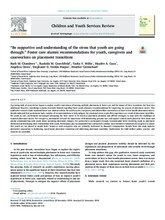Displaying 371 - 380 of 991
This study incorporated a network approach to understanding how youth discussed strong ties and defined closeness in relationships.
This paper reports findings from an innovative arts-based intervention with Looked After Children and young people and concludes that holding competing value sets in creative tension is central to the success of the programme in helping young people to cope with and contest social harm.
Through a review of implemented programs to reunite street-involved children and youth (SICY) with their families as well as relevant formative research on family-level risk factors for street migration, the authors of this study explore family-level factors relevant to successful family reintegration of SICY.
This end of project evaluation aimed to synthesise the wealth of data and learnings captured over the life of the Family Reintegration and Prevention of Separation (FRAPS) project to determine if project objectives were met, to complement existing data with primary data collection related to final project outcomes, and to provide a final product that can be used to appreciate the project achievements, challenges and learnings and to guide future programming.
In this article, Patricia O'Rourke describes the way in which she applies psychodrama in her therapeutic reunification work with parents and babies in the child protection system in Australia.
Theoretically informed by intersectionality, queer, and feminist theories, the purpose of this community based qualitative research study was to gain a nuanced understanding of the experiences of 25 diverse LGBTQ former foster youth before, during, and after being in foster care.
This qualitative research study examined foster care alumni’s advice for youth in care, caregivers, and child welfare caseworkers on how to best handle placements moves.
A number of psychological factors have been found to be relevant in terms of problematic use of digital devices. Some of them may serve as risk factors, while others mean protection. The main goal of present study was to determine user profiles and to examine differences among them based on several psychological variables using cluster analysis.
This study used a dataset of 1426 young adults experiencing homelessness (YAEH) from 7 different US cities to examine the historical risk and resilience characteristics of those involved in foster care alone, juvenile justice alone, both systems (dual status), and no system involvement.
This study examined family- and state child welfare system predictors of successful reunification in the United States, or reunification with no reentries into foster care.





